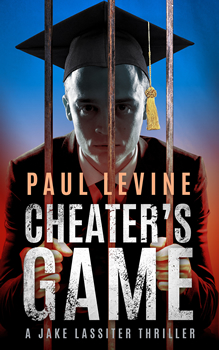

July 6 – 12: “Do you encourage your family and community to read more?”
 ITW members Elena Taylor, Paul Levine, Joanna Davidson Politano, Melissa Kosci, Paul D. Marks, Elizabeth Goddard, TG Wolff and Frank Zafiro join us this week as we talk about our impact on those around us. Do you encourage your family and community to read more? What can we do to gain future readers? Scroll down to the “comments” section to follow along. You won’t want to miss it!
ITW members Elena Taylor, Paul Levine, Joanna Davidson Politano, Melissa Kosci, Paul D. Marks, Elizabeth Goddard, TG Wolff and Frank Zafiro join us this week as we talk about our impact on those around us. Do you encourage your family and community to read more? What can we do to gain future readers? Scroll down to the “comments” section to follow along. You won’t want to miss it!
 Melissa Kosci is a fourth-degree black belt in and certified instructor of Songahm Taekwondo. In her day job as a commercial property manager, she secretly notes personal quirks and funny situations, ready to tweak them into colorful additions for her books. She and Corey, her husband of twenty years, live in Florida, where they do their best not to melt in the sun.
Melissa Kosci is a fourth-degree black belt in and certified instructor of Songahm Taekwondo. In her day job as a commercial property manager, she secretly notes personal quirks and funny situations, ready to tweak them into colorful additions for her books. She and Corey, her husband of twenty years, live in Florida, where they do their best not to melt in the sun.
 Paul D. Marks is the author of the Shamus Award-Winning mystery-thriller White Heat. His short stories have won numerous awards: Windward was included in the Best American Mystery Stories of 2018 and won the Macavity Award. His story Ghosts of Bunker Hill was voted #1 in the 2016 Ellery Queen Mystery Magazine Readers Award. Brendan DuBois, NY Times best-selling author, says Paul’s latest novel The Blues Don’t Care is “finely written” and “highly recommended.”
Paul D. Marks is the author of the Shamus Award-Winning mystery-thriller White Heat. His short stories have won numerous awards: Windward was included in the Best American Mystery Stories of 2018 and won the Macavity Award. His story Ghosts of Bunker Hill was voted #1 in the 2016 Ellery Queen Mystery Magazine Readers Award. Brendan DuBois, NY Times best-selling author, says Paul’s latest novel The Blues Don’t Care is “finely written” and “highly recommended.”
 Elena Taylor wrote the humorous Eddie Shoes Mystery Series under the name Elena Hartwell. Now she returns to her dramatic roots—she spent over 20 years in the theater—with this darker, more psychological tale. When she’s not writing, she’s either working with writers one-on-one as a developmental editor with Allegory Editing, or spending time with her two horses at the stables or her two cats, one dog, and one husband at their home in beautiful Snoqualmie Valley, Washington.
Elena Taylor wrote the humorous Eddie Shoes Mystery Series under the name Elena Hartwell. Now she returns to her dramatic roots—she spent over 20 years in the theater—with this darker, more psychological tale. When she’s not writing, she’s either working with writers one-on-one as a developmental editor with Allegory Editing, or spending time with her two horses at the stables or her two cats, one dog, and one husband at their home in beautiful Snoqualmie Valley, Washington.
 Paul Levine worked as a newspaper reporter, a law professor and a trial lawyer before becoming a full-time novelist. Obviously, he cannot hold a job. Paul claims that writing fiction comes naturally: he told whoppers for many years in his legal briefs. His books have been translated into 23 languages, none of which he can read. In Germany, his first novel, “TO SPEAK FOR THE DEAD,” has recently been published as “In Vertretung Der Toten.”
Paul Levine worked as a newspaper reporter, a law professor and a trial lawyer before becoming a full-time novelist. Obviously, he cannot hold a job. Paul claims that writing fiction comes naturally: he told whoppers for many years in his legal briefs. His books have been translated into 23 languages, none of which he can read. In Germany, his first novel, “TO SPEAK FOR THE DEAD,” has recently been published as “In Vertretung Der Toten.”
 Joanna Davidson Politano writes historical novels of mystery and romance, including her debut Lady Jayne Disappears. She loves tales that capture the colorful, exquisite details in ordinary lives and is eager to hear anyone’s story. She lives with her husband and their two babies in a house in the woods near Lake Michigan
Joanna Davidson Politano writes historical novels of mystery and romance, including her debut Lady Jayne Disappears. She loves tales that capture the colorful, exquisite details in ordinary lives and is eager to hear anyone’s story. She lives with her husband and their two babies in a house in the woods near Lake Michigan
 Elizabeth Goddard is the bestselling author of more than 40 books, including Never Let Go, Always Look Twice, and the Carol Award–winning The Camera Never Lies. Her Mountain Cove series books have been finalists in the Daphne du Maurier Awards and the Carol Awards. Goddard is a seventh-generation Texan.
Elizabeth Goddard is the bestselling author of more than 40 books, including Never Let Go, Always Look Twice, and the Carol Award–winning The Camera Never Lies. Her Mountain Cove series books have been finalists in the Daphne du Maurier Awards and the Carol Awards. Goddard is a seventh-generation Texan.
 TG Wolff writes thrillers and mysteries that play within the gray area between good and bad, right and wrong. Cause and effect drive the stories, drawing from 20+ years’ experience in civil engineering, where “cause” is more often a symptom of a bigger, more challenging problem. Diverse characters mirror the complexities of real life and real people, balanced with a healthy dose of entertainment. T G Wolff holds a master’s degree in civil engineering and is a member of Mystery Writers of America and Sisters in Crime.
TG Wolff writes thrillers and mysteries that play within the gray area between good and bad, right and wrong. Cause and effect drive the stories, drawing from 20+ years’ experience in civil engineering, where “cause” is more often a symptom of a bigger, more challenging problem. Diverse characters mirror the complexities of real life and real people, balanced with a healthy dose of entertainment. T G Wolff holds a master’s degree in civil engineering and is a member of Mystery Writers of America and Sisters in Crime.
 Frank Zafiro was a police officer in Spokane, Washington, from 1993 to 2013. He retired as a captain. He is the author of numerous crime novels, including the River City novels and the Stefan Kopriva series. He lives in Redmond, Oregon, with his wife Kristi, dogs Richie and Wiley, and a very self-assured cat named Pasta. He is an avid hockey fan and a tortured guitarist.
Frank Zafiro was a police officer in Spokane, Washington, from 1993 to 2013. He retired as a captain. He is the author of numerous crime novels, including the River City novels and the Stefan Kopriva series. He lives in Redmond, Oregon, with his wife Kristi, dogs Richie and Wiley, and a very self-assured cat named Pasta. He is an avid hockey fan and a tortured guitarist.
- LAST GIRL MISSING with K.L. Murphy - July 25, 2024
- CHILD OF DUST with Yigal Zur - July 25, 2024
- THE RAVENWOOD CONSPIRACY with Michael Siverling - July 19, 2024
